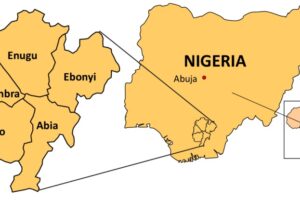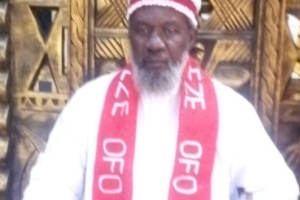By Tony Ezike

In Anambra State, the intersection of traditional leadership and formal education has yielded significant benefits for community development. Educated monarchs have adeptly bridged cultural heritage with modern governance, enhancing their roles as custodians of tradition and facilitators of progress.
Case Study of selected Traditional Rulers:
- Igwe Nnaemeka Alfred Achebe (Obi of Onitsha)
Education: Graduated from Stanford University and Columbia University.
Role in Community Service: Promotes economic development and cultural preservation, spearheads youth empowerment programs, and fosters inter-community cooperation.
- Igwe Kenneth Onyeneke Orizu III (Igwe of Nnewi)
Education: Attended prestigious institutions in Nigeria and abroad.
Role in Community Service: Encourages industrialization, supports technological innovations in Nnewi, and advocates for vocational education.
- Igwe Peter Uyanwa (Eze Dike of Ukwulu)
Education: Holds advanced degrees in Management and Political Science.
Role in Community Service: Advocates for effective local governance and leads infrastructural development projects.
- Igwe Alex Nwokedi (Uthoko of Achalla)
Education: Graduated from the University of Nigeria, Nsukka.
Role in Community Service: Drives environmental sustainability initiatives and health outreach programs.
- Igwe Robert Eze (Okofia VI of Ukpo)
Education: Holds a degree in Economics.
Role in Community Service: Facilitates rural development projects and education scholarships for the youth.
- Igwe Chidubem Iweka III (Eze Oba of Obosi)
Education: Studied Literature and Journalism.
Role in Community Service: Advocates for literacy programs and serves as a mediator in inter-communal disputes.
- Igwe Dr. Emeka Ilouno (Eze of Ifitedunu)
Education: Medical doctor by training.
Role in Community Service: Provides free healthcare services and medical awareness campaigns.
- Igwe Christopher Idigo V (Olu Idigo of Aguleri)
Education: Holds degrees in Public Administration.
Role in Community Service: Works on conflict resolution and cultural heritage promotion in Aguleri.
- Igwe Lawrence Agubuzu (Ezeoha II of Olo)
Education: Studied International Relations.
Role in Community Service: Leads in regional integration efforts and youth mentorship.
- Igwe Donatus Nnabuike Uyanwunne (Eze Iduu Eri of Enugwu-Ukwu)
Education: Holds a degree in Engineering.
Role in Community Service: Champions infrastructure development and technical skills acquisition.
- Igwe Prof. Chukwuemeka Ike (Late Ikelionwu XI of Ndikelionwu)
Education: An academician and author.
Role in Community Service: Advocated for education reforms and supported creative writing among youths.
- Igwe Charles Nkpume (Ezeani of Abagana)
Education: Holds a Master’s degree in Business Administration.
Role in Community Service: Facilitates small business development programs.
- Igwe John Umenyiora (Ezedioramma of Ogbunike)
Education: Educated in Political Science and Business Management.
Role in Community Service: Promotes tourism through the development of the Ogbunike Cave.
- Igwe Augustine Agballah (Eze of Awkuzu)
Education: A graduate of Agricultural Science.
Role in Community Service: Leads agricultural development programs and food security initiatives.
- Igwe Damian Okeke (Ezeani of Umuoji)
Education: Studied Philosophy.
Role in Community Service: Fosters peacebuilding and inter-religious dialogue.
- Igwe Godwin Mbamalu (Igwe of Ojoto)
Education: Holds advanced degrees in History and Education.
Role in Community Service: Preserves cultural history and promotes education in his community.
- Igwe Rowland Odegbo (Abogu II of Nteje)
Education: Trained as a Legal Practitioner.
Role in Community Service: Advocates for legal aid and human rights in rural communities.
- Igwe Raphael Okoye (Ezeoha of Awgbu)
Education: Holds a degree in Engineering.
Role in Community Service: Leads infrastructural development and renewable energy projects.
- Igwe Prof. Laz Ekwueme (Late Traditional Ruler of Oko)
Education: Renowned Professor of Music and Arts.
Role in Community Service: Advocated for arts education and supported cultural festivals in Oko.
- Igwe Sunday Okafor (Eze Nri-Enwelani II of Nri Kingdom)
Education: Studied Cultural Anthropology.
Role in Community Service: Works on the preservation of Igbo cultural heritage and traditions.
- Igwe Azuka Ngodi (Igwe of Atani)
Education: Holds a degree in Political Science and Public Administration.
Role in Community Service: Leads initiatives for community infrastructural development, especially in flood-prone areas of Atani.
Advocates for education and vocational training, particularly for youths and women.
Plays a key role in promoting environmental sustainability and disaster preparedness in the riverine communities.
Fosters inter-communal collaboration for peace and development in Ogbaru Local Government Area.
Impact of Education:
The exemplary leadership of Igwe Azuka Ngodi of Atani for instance highlights the importance of education in addressing community-specific challenges, such as flood management and advocacy for marginalized groups. His leadership demonstrates how formal education equips traditional rulers to tackle environmental and social issues with informed strategies.
The semi-literate monarchs on the other hand are constrained by lack of sound academic background needed for high-level interactions and the ability to negotiate competitively amongst the elites and other corporate entities, for the interest of their various communities. This implies that such people are rather equipped to be cabinet members whereby their local intelligence and connection to the grassroots will be more effective.
Educated monarchs utilize their knowledge to draft and implement policies beneficial to their communities. They initiate skill acquisition and scholarship programs to foster youth development. With their exposure and training, they mediate disputes effectively and promote unity. They attract investments and partnerships, boosting local economies. Their academic background helps them balance tradition with modernity, ensuring cultural preservation.




